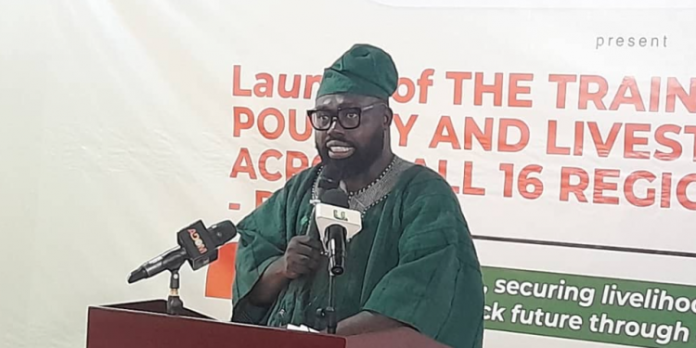Government has unveiled a comprehensive roadmap for the national rollout of the ‘Nkoko Nketenkete’ initiative—an ambitious youth-driven poultry and livestock development programme under the Feed Ghana flagship policy.
Launched in Accra on June 10, 2025, the initiative aims to equip 20,000 young Ghanaians—mostly women, youth groups, and agripreneurs—with skills and resources over the next four years. The first phase will reach 10,000 beneficiaries between 2025 and the end of 2026, with the overall programme expected to create approximately 1.7 million direct and indirect jobs.
The programme is a public-private partnership involving the Presidency, Ministry of Food and Agriculture, CSIR-Animal Research Institute, and Feedico Ghana Limited, among others.
Training Plan and Approach
The roadmap outlines a regional training structure with two sessions held monthly in all 16 regions. A blended approach—combining digital platforms, field demonstrations, and one-on-one mentorship—will be used, with training delivered in local languages for maximum impact.
Speaking at the launch, Dr. Peter Boamah Otokunor, Director of Presidential Initiatives in Agriculture and Agribusiness, said the sector must shift from traditional practices to innovation-driven agribusiness. “Agriculture is no longer about hoes and cutlasses. It’s a business that thrives on innovation, productivity, and modern technology,” he stated.
Dr. Otokunor added that President John Dramani Mahama is committed to rolling out transformative agricultural programmes under the Feed Ghana banner, removing barriers that prevent women and youth from fully participating in the sector.
Poultry and Feed Targets
The full rollout of the young poultry and livestock farmers module will engage 55,000 households to produce one million improved broiler breeds. Government also plans to upgrade feed mills nationwide to make animal feed more affordable and accessible.
“With strong partnerships and political will, Ghana’s poultry and livestock industry will rise again,” Dr. Otokunor declared.

Challenges and Strategic Interventions
Dr. Doris Yaa Osei, Acting Deputy Director at CSIR-Animal Research Institute, underscored Ghana’s struggle to meet rising meat demand. She pointed to the government’s Grains and Legumes Development Project—also under Feed Ghana—as a key intervention to scale up maize, rice, soybean, and sorghum production for animal feed.
Feedico Ghana Limited CEO, Chief Nathaniel Ebo Nsarko, praised the roadmap as a game-changer for smallholder farming. He noted that the initiative aims to certify and empower over 10,000 youth to become skilled, business-oriented players in the poultry and livestock value chain.
He further emphasized the importance of using local languages in training delivery. “Knowledge must not be lost in translation. It must reach those who need it most in the language they understand,” he said.
Tackling Unemployment and Food Insecurity
The ‘Nkoko Nketenkete’ roadmap directly addresses two of Ghana’s most pressing challenges—youth unemployment and low self-sufficiency in meat production. The initiative also aligns with several UN Sustainable Development Goals, including Goals 2 (Zero Hunger), 8 (Decent Work and Economic Growth), 12 (Responsible Consumption and Production), 13 (Climate Action), and 7 (Affordable and Clean Energy)
























































![[FREE FREE MONEY] Predict and Win a Guaranteed GH¢200 From Us EVERY WEEK](https://wordpress.ghanatalksradio.com/wp-content/uploads/2022/02/Predict-and-Win-Final-09-03-2021-218x150.jpg)
![[Predict & Win – 8th/Oct.] WIN A Guaranteed ¢200 From Us This Week](https://wordpress.ghanatalksradio.com/wp-content/uploads/2021/10/maxresdefault-16-218x150.jpg)
![[Predict & Win – 2nd] WIN A Guaranteed ¢200 From Us This Week](https://wordpress.ghanatalksradio.com/wp-content/uploads/2021/09/maxresdefault-50-218x150.jpg)
![[Predict & Win – 25th] WIN A Guaranteed ¢200 From Us This Week](https://wordpress.ghanatalksradio.com/wp-content/uploads/2021/09/maxresdefault-36-218x150.jpg)
![[Predict & Win – 18th] WIN A Guaranteed ¢200 From Us This Week](https://wordpress.ghanatalksradio.com/wp-content/uploads/2021/09/maxresdefault-23-218x150.jpg)









![[National cathedral] See full list of churches that have contributed since 2018](https://wordpress.ghanatalksradio.com/wp-content/uploads/2020/09/Ghana-National-Cathedral-GhanaTalksRadio-100x70.jpg)



